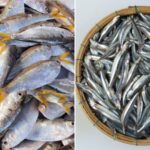Mackerel is not just a delicious fish, but it is also highly nutritious. Studies have shown that this fish contains impressive levels of omega-3 fatty acids, even surpassing salmon, which has long been hailed as the “king of omega-3”.
Omega-3 is an essential fatty acid that plays a crucial role in cardiovascular health and cognitive development. However, the human body cannot synthesize this type of fat, hence the need to obtain it through diet.
According to Healthline, 100 grams of mackerel contains approximately 4.5–5.5 grams of omega-3, significantly higher than salmon (2–4 grams/100 grams). This places mackerel at the top of the list for omega-3 content, far surpassing other familiar fish such as herring (2.1 grams), sardines (1.4 grams), and anchovies (0.4 grams).
In addition to its high omega-3 content, mackerel is also a rich source of vitamin B12 and selenium, two important micronutrients that aid in energy metabolism and support bone health. Thanks to these benefits, mackerel deserves a place in the weekly menu of every family.
**The Fish That Dethroned Salmon: Easily Available in Local Markets, Great for Heart, Brain, and Bone Health**
**Promotes Heart Health**
Mackerel, one of the most popular fatty fish, is recommended by the American Heart Association to be consumed at least twice a week. Due to its high omega-3 content, mackerel helps lower blood pressure, improve cholesterol levels, reduce the risk of atherosclerosis, and ease the burden on the heart during blood pumping.
Moreover, mackerel is rich in selenium, magnesium, potassium, and zinc, essential minerals that help protect and maintain a stable cardiovascular system. Studies have shown that individuals who regularly consume mackerel tend to have more stable blood pressure and a reduced risk of cardiovascular diseases, including stroke.

**Helps Control Blood Sugar Levels**
As a source of high-quality protein and low in saturated fat, mackerel is especially suitable for people with diabetes. It helps provide a prolonged feeling of fullness while keeping blood sugar levels from spiking after meals.
A study published in the *British Journal of Nutrition* found that blood sugar levels tended to decrease after the consumption of omega-3-rich fish like mackerel, salmon, and sardines. This is particularly important for individuals with diabetes, as they often face a higher risk of cardiovascular complications. The study also indicated that regular consumption of fatty fish led to significant improvements in blood sugar control, supporting diabetes management.
**Strengthens Bone Health**
Mackerel is one of the best natural sources of vitamin D, which plays a pivotal role in calcium and phosphorus absorption, thereby fortifying the skeletal system. Vitamin D deficiency is a contributing factor to the increased risk of osteoporosis and bone fractures, especially in postmenopausal women.
Additionally, macker McEl also contains copper and selenium, minerals that help improve bone density, enhance recovery from injuries, and maintain the resilience of the skeletal system.

**Boosts Brain Function and Memory**
Mackerel, with its high content of omega-3, particularly DHA, is essential for brain development and maintenance of cognitive function. DHA improves memory, concentration, and reduces the risk of neurological issues such as depression, anxiety, and even Alzheimer’s disease.
Just one serving of mackerel can provide nearly three times the daily recommended intake of vitamin B12. This vitamin is vital for efficient nervous system function, maintaining mental acuity, and enhancing cognitive performance.
**Precautions When Including Mackerel in Your Daily Diet**
While mackerel is a nutrient-rich food, it is important to consider some key points to maximize its benefits without compromising your health.
Certain types of mackerel, such as king mackerel or Spanish mackerel, are known to have potentially high mercury content. Excessive consumption of mercury can accumulate in the body and pose risks to the nervous system, especially for pregnant or breastfeeding women, as it can affect the development of the fetus and newborn.
To ensure safety, opt for mackerel species with lower mercury levels, such as Japanese mackerel or Atlantic mackerel. It is also advisable to consume mackerel in moderate frequencies to limit potential exposure to heavy metals.
Additionally, some individuals may experience allergic reactions to mackerel, ranging from skin rashes to nausea, headaches, or itching. If you are new to mackerel, start with a small portion to observe your body’s response before including it in your long-term diet.





































